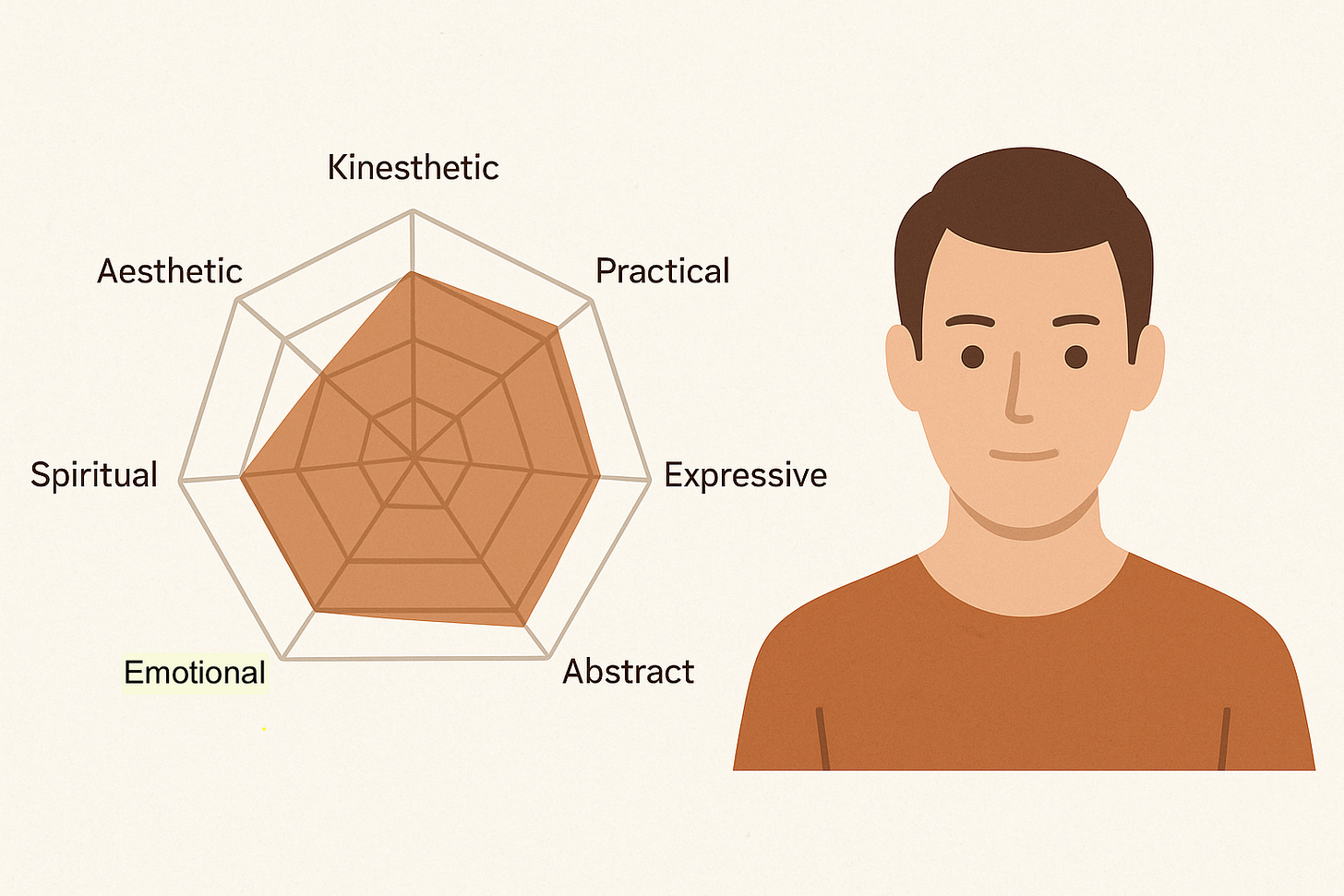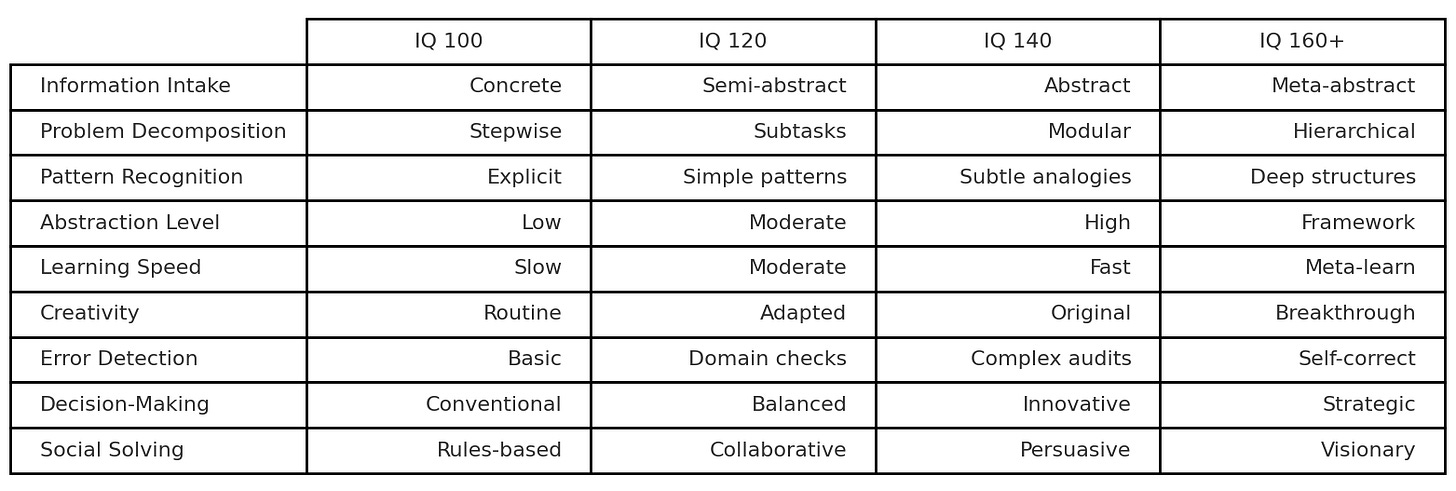— George Box
Intelligence can be broken down into components.
Beyond IQ, EQ is the most talked about. AI already crushes humans at emotional intelligence tests. That’s not surprising. Emotional regulation and empathy should be incredibly easy for a computer. They don’t get flustered or angry… let’s keep it that way.
Intelligence Framework
Enneagram is my favorite framework for personality traits. My favorite framework of intelligence is the ancestor wiki. It says there are seven different types of intelligence:
Kinesthetic (athletes, dancers)-- coordination
Aesthetic (musicians, artists, designers)-- vibe
Practical (executives, assistants)-- tactical
Emotional (nurses, waiters)-- relational
Expressive (actors, politicians, comedians)-- communicative
Abstract (physicists, economists, doctors)-- analytical/IQ
Spiritual (priests, monks, prophets)-- purpose
When I first read this, it clicked. The framework helped make sense of a messy reality.
I’ve worked with people who had high aesthetic, practical, and abstract intelligence (IQ). But they severely lacked expressive and emotional intelligence. They were controlled by their emotional state and couldn’t communicate, which led to constantly rubbing others the wrong way.
I’ve also worked with people who have high emotional, expressive, and abstract intelligence but little practical intelligence. They’re amazing on paper but can’t execute. People like this make recruiting hard, as it’s easy to give the illusion of possessing grit. Some of these individuals have succeeded by failing upwards in the business world. I’ve worked with former C-suite executives at Fortune 50 companies who were this. They’re quietly known as the people whom others can’t get to operate.
IQ
IQ matters. The intellectually honest recognize the massive implications of IQ on society and demographic representation.
One of my best friends recently learned they have an IQ of 176. They took a proctored Stanford-Binet test. For context, around one in five million people have an IQ of 176 or above. We discuss how IQ is important, but it’s not everything… not even close.
IQ has a weak correlation to character and personality traits. Conscientiousness, extraversion, agreeableness, and grit have no correlation with IQ.
Business Intelligence
The intelligence most needed for business success is practical. However, practical, expressive, emotional, aesthetic, spiritual, and kinesthetic intelligence each effectively have no correlation with IQ. The correlations that exist are rounding errors; for example, the largest is a 10% positive shared variance between expressive intelligence and IQ.
The most important thing for business success is having an IQ above 120, extreme practical intelligence, and at least moderate expressive intelligence. You can be competent, efficient, disciplined, and ruthlessly prioritize with an IQ in the 120s. A higher IQ than 120 doesn’t help unless the company is solving a complex systems problem. The vast majority of companies are not.
As for other intelligences— kinesthetic, aesthetic, and spiritual intelligence aren’t important unless they impact your product/service. A design studio needs elevated aesthetic intelligence. Similarly, emotional intelligence is crucial for operating in hospitality. However, it’s unnecessary to run most companies – emotional intelligence helps avoid lawsuits and may lead to a slightly happier, more productive workforce. A great nice-to-have.
Application
When categorizing the people in my life by their strengths and weaknesses in each intelligence, their past actions check out. Create a version of a character in a game where their stats in each intelligence are shown (like the image above). You’ll notice future actions that you had to intuit before become consciously easier to predict. This is what great frameworks do— help model the world.
Are there more types of intelligence than these seven? Abstract intelligence is essentially IQ. We can break IQ down into mathematical reasoning, problem-solving, pattern recognition, and spatial reasoning.
We could also break down emotional intelligence into interpersonal and intrapersonal intelligence. Then we could further break down interpersonal into social perceptiveness, behavioral flexibility, and social competence. We can keep going, but the abstraction of the seven intelligences is good enough.
At the most granular level, it’s probably hard to find someone who is better than another person at every conceivable type of intelligence. Maybe everyone is uniquely smart. Maybe.
Too Smart
There are weaknesses to being too strong in any given intelligence. When we’re great at one thing, we apply that to everything in life. Just because you have a hammer, it doesn’t mean every problem is a nail. The most common is someone high in practical intelligence, ignoring aesthetic or emotional concerns. Positive patterns in one area are anti-patterns in others.
If, say, Steve, has maxed out emotional intelligence, Steve may attribute someone’s emotional state to his actions. “They must be upset with me.” Steve’s correct in assessing the exact emotional state, but they’re wrong in assessing the why behind it. Yes, they’re upset, but not with Steve.
We use our best intelligence as a hammer, assuming the world is nails. Clarity of thought requires using the right combination of intelligences to address each situation.
Utilizing Intelligence
Know your intelligence profile and find people to complement you. If you lack practical intelligence, hire assistants to organize your life and push you to execute. If you’re bad at emotional intelligence, have someone you trust save you from faux pas and teach you in private after. If you’re high in kinesthetic intelligence and lack abstract intelligence, hire a registered investment advisor.
We don’t need to be maxed out in every intelligence. I mean, I think it’s more fun to be. But to scale yourself, double down on what you’re best at, and find others to complement you.




